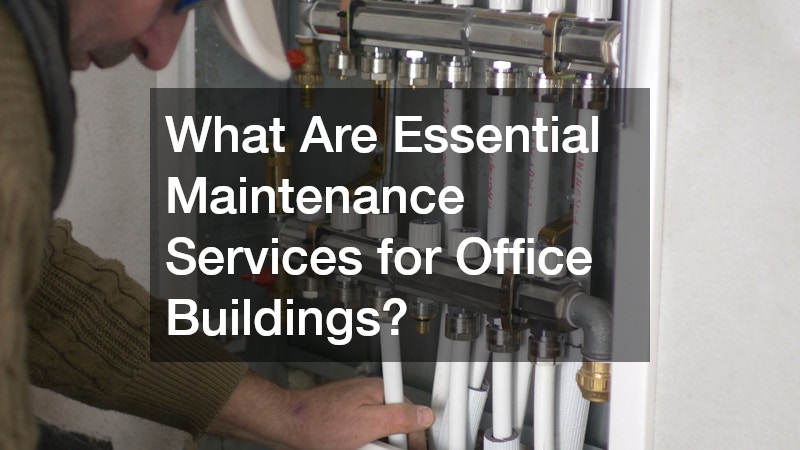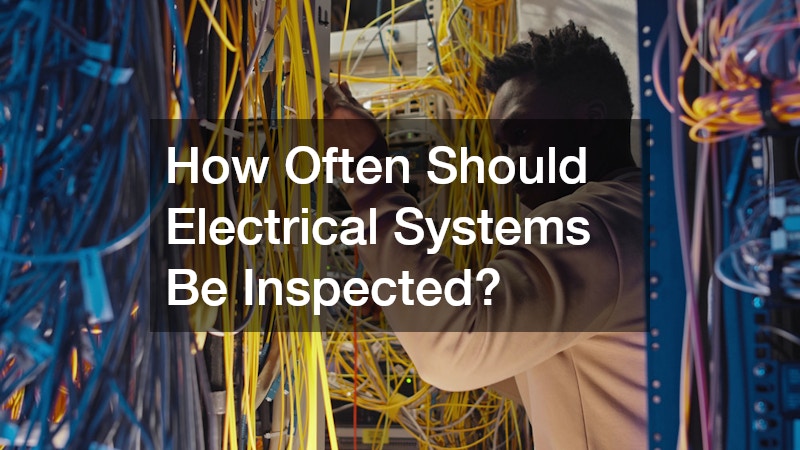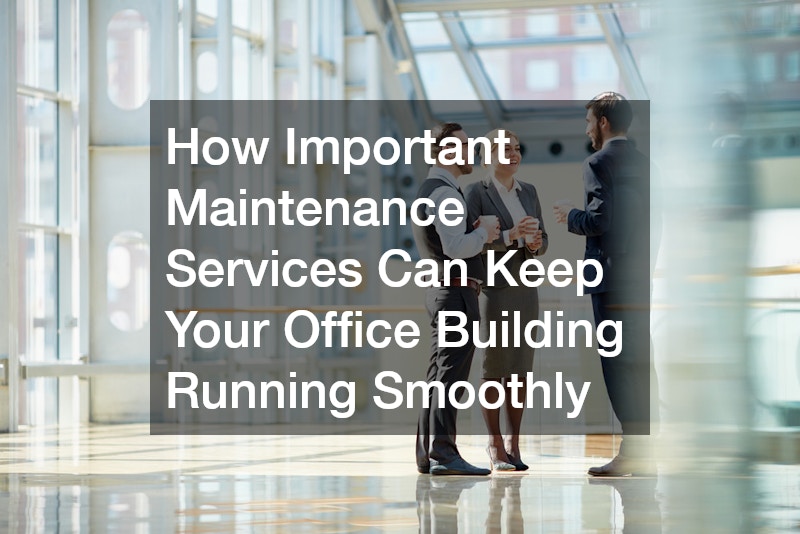A well-maintained office building is the foundation of a productive and efficient business environment. When essential systems function properly, employees can focus on their work without disruptions. Maintenance services not only ensure the longevity of building components but also contribute to safety, comfort, and sustainability. From electrical systems and HVAC units to commercial elevators and custom aluminum railings, each aspect of building care plays a vital role. In this guide, we’ll explore the key maintenance services that keep an office building running smoothly, highlighting how professional care and preventive strategies benefit both businesses and property owners.
What Are Essential Maintenance Services for Office Buildings?

Understanding Routine Inspections
Routine inspections are critical to identifying issues before they become costly problems. These inspections often include examining electrical wiring, plumbing systems, structural integrity, and air quality. They also cover smaller but essential details such as the condition of custom aluminum railings, which provide safety and visual appeal in stairwells, balconies, and entryways. Regular checks help ensure compliance with building codes and create a safer environment for employees and visitors.
Critical Systems to Monitor
Certain building systems require more consistent monitoring than others. HVAC units, elevators, plumbing, and lighting all directly affect comfort and safety. Commercial elevators, for example, must be inspected frequently to ensure they operate smoothly and safely throughout the workday. Commercial builders often work alongside property managers to develop maintenance schedules that align with the building’s usage and size. This collaboration ensures that every component—from structural supports to waste disposal service areas—is operating efficiently.
Importance of Scheduled Maintenance
Scheduled maintenance helps businesses avoid downtime by addressing small issues before they escalate. Regular upkeep of mechanical systems, roofing, insulation, and flooring helps preserve the integrity of the entire structure. Using local spray foam insulation, for instance, improves energy efficiency and enhances indoor comfort by sealing gaps that cause air leakage. Similarly, applying commercial floor coating in high-traffic areas protects surfaces from wear and makes cleaning easier, improving both safety and appearance.
The Role of Facility Managers
Facility managers are responsible for coordinating inspections, maintenance, and repairs throughout the building. Their job often involves working closely with a commercial general contractor to schedule preventive maintenance, track completed work, and oversee compliance with safety standards. Facility managers also ensure that cleaning supplies are properly stocked and used effectively, maintaining sanitary conditions across all office spaces.
Key Tools and Technologies
Advancements in technology have revolutionized how maintenance services are managed. Building automation systems monitor energy use, temperature, and security, alerting facility managers to issues in real time. Predictive maintenance software can even forecast when mechanical systems may fail, allowing proactive repairs. By integrating these technologies, building operators reduce downtime and extend the lifespan of major assets such as HVAC systems, commercial elevators, and plumbing lines.
Why Is HVAC Maintenance Crucial in Office Buildings?
Improving Air Quality
Indoor air quality directly affects employee health and performance. Dust, mold, and pollutants can build up in ventilation systems if left unchecked. Regular maintenance of HVAC systems, including duct cleaning and filter replacement, ensures clean air circulation throughout the building. Local spray foam insulation can also improve air quality by preventing outdoor pollutants and allergens from seeping indoors, helping maintain a comfortable and healthy environment.
Cost-Effective Energy Usage
Energy efficiency is one of the most important benefits of proper HVAC maintenance. When systems operate efficiently, they consume less power, reducing monthly utility bills. Sealing gaps with spray foam insulation minimizes energy loss, helping the HVAC system maintain a steady temperature without overworking. These measures not only save money but also align with modern sustainability goals for commercial properties.
Extending System Lifespan
HVAC systems are a significant investment, and regular maintenance helps maximize their lifespan. Routine servicing, part replacements, and calibrations prevent premature wear. Commercial builders often recommend professional service contracts to ensure systems receive consistent attention, helping property owners avoid costly replacements and extend the life of their mechanical equipment.
Comfortable Work Environment
A comfortable environment contributes to higher employee morale and productivity. Properly maintained HVAC systems ensure consistent temperatures throughout the office, eliminating hot and cold spots. When combined with efficient insulation and clean airflow, this creates a balanced and pleasant workspace that supports focus and well-being.
Identifying Common HVAC Issues
Issues like refrigerant leaks, thermostat malfunctions, and blocked ducts can cause energy inefficiency or system breakdowns. Regular maintenance allows these problems to be detected early. By hiring experienced technicians, facility managers can ensure timely repairs and reduce the likelihood of major system failures that disrupt business operations.
How Often Should Electrical Systems Be Inspected?

Guidelines for Regular Inspections
Electrical systems should be inspected annually, though large or older office buildings may require more frequent assessments. Professional inspections help verify that panels, outlets, and wiring meet safety standards. A commercial general contractor may also coordinate these inspections during renovations to ensure all upgrades adhere to current codes and energy-efficient practices.
Spotting Early Warning Signs
Flickering lights, tripped breakers, or unusual smells can indicate electrical problems. Recognizing these signs early allows for immediate repairs, preventing potential hazards. Building staff should be trained to report any irregularities promptly to ensure professional intervention before problems escalate.
Reducing Risk of Electrical Fires
Electrical malfunctions are one of the leading causes of office fires. Routine inspections, proper grounding, and timely upgrades reduce this risk significantly. Investing in high-quality wiring materials and following maintenance schedules minimizes the potential for dangerous overloads.
Regulations and Compliance
Maintaining compliance with local and national electrical codes is crucial for both safety and liability reasons. Working with certified electricians ensures all repairs and installations meet required standards. Compliance audits can also protect property owners from fines or legal disputes related to unsafe electrical conditions.
Training for In-House Personnel
Educating building staff on electrical safety procedures helps prevent accidents. Employees should understand how to identify hazards, operate circuit breakers, and report issues safely. In-house training programs strengthen the overall safety culture within the workplace.
What Are the Benefits of Regular Elevator Maintenance?
Ensuring Passenger Safety
Commercial elevators play a critical role in office operations, especially in multi-story buildings. Routine elevator service ensures that all components—such as cables, doors, and emergency systems—are functioning safely. Regular testing and lubrication reduce the risk of sudden malfunctions that could endanger occupants.
Minimizing Operational Downtime
When elevators fail, employees waste time waiting for repairs or using stairs, which affects productivity. Scheduled maintenance reduces these disruptions by addressing mechanical issues proactively. Many commercial general contractors work closely with elevator technicians to create maintenance schedules that minimize downtime.
Life Expectancy of Elevators
Proper maintenance extends the lifespan of elevators by preventing excessive wear on components. Lubrication, inspections, and timely part replacements all contribute to smoother performance and longer service life. A consistent elevator service plan keeps systems operating efficiently for years to come.
Compliance with Laws and Standards
Elevators must comply with strict safety regulations. Routine inspections ensure that commercial elevators meet all legal standards and are equipped with proper emergency features. Maintaining up-to-date inspection certificates also reassures tenants and visitors that the building prioritizes safety.
Emergency Preparedness
In the event of an emergency, elevators must operate according to safety protocols. Maintenance teams test alarm systems, communication devices, and power backup systems regularly to guarantee readiness. By having these systems in place, property owners reduce liability and ensure safe evacuation during power outages or fires.
How Can Plumbing Maintenance Prevent Major Issues?
Spotting Leaks Early
Even minor leaks can lead to significant water damage if ignored. Regular plumbing inspections help identify weak seals, corroded pipes, and faulty connections early on. Addressing these issues promptly prevents costly repairs and potential structural damage.
Avoiding Water Damage
Unchecked leaks can compromise walls, flooring, and electrical systems. Routine maintenance ensures that plumbing fixtures, water heaters, and drainage systems operate properly. Professional plumbers also check for corrosion or mineral buildup that can reduce water flow and efficiency.
Cost Savings from Regular Checks
Preventive maintenance reduces the likelihood of emergency repairs, which are typically more expensive. Scheduled plumbing inspections allow businesses to plan for maintenance costs instead of facing unexpected financial burdens.
Water Quality and Efficiency
Clean water is essential for both employees and building operations. Routine testing and maintenance protect against contamination and ensure efficient flow throughout the facility. Businesses that rely on a commercial laundry service especially benefit from well-maintained water systems that support high-demand usage.
Handling Emergency Repairs
When plumbing emergencies occur, quick response times are essential. Having a reliable maintenance contractor on call ensures minimal disruption. They can address burst pipes or drain clogs efficiently, restoring normal operations without significant downtime.
What Are the Consequences of Neglecting Structural Maintenance?

Identifying Structural Weaknesses
Structural maintenance involves more than just cosmetic fixes. Cracks, leaks, or shifting foundations can indicate deeper problems that threaten the building’s integrity. Regular assessments help identify weak points that require immediate attention.
Preventing Long-Term Damage
Early intervention prevents small issues from escalating into major structural failures. Commercial builders often collaborate with engineers to reinforce weakened areas, preventing further deterioration. Maintaining strong structural elements ensures long-term stability and safety.
Financial Implications
Ignoring maintenance can lead to significant repair costs down the line. Proactive care, including protective coatings and reinforcements, helps preserve property value. For example, applying commercial floor coating in garages, basements, and hallways helps protect concrete surfaces from wear and moisture damage, reducing long-term expenses.
Safety Risks and Liability
Structural neglect increases the likelihood of accidents or injuries. Property owners may face legal liability if damage results in harm. Regular inspections and maintenance mitigate these risks and demonstrate a commitment to safety.
Utilizing Professional Assessments
Hiring a commercial general contractor or structural engineer ensures that inspections are thorough and repairs meet professional standards. Their expertise allows them to identify potential hazards and recommend reliable, long-lasting solutions.
How Do Maintenance Services Contribute to Workplace Safety?
Identifying Hazards Early
Regular maintenance allows teams to spot potential hazards such as frayed wiring, broken handrails, or uneven flooring. Addressing these issues quickly reduces the likelihood of workplace accidents.
Implementing Safety Protocols
Maintenance crews work closely with safety officers to implement emergency and safety procedures. This includes maintaining fire alarms, exit signage, and sprinkler systems, ensuring compliance with all regulations.
Keeping Emergency Systems Operational
Testing backup generators, fire extinguishers, and emergency lighting systems ensures they’re ready when needed. Maintenance teams also oversee waste disposal service areas to prevent fire hazards or contamination risks, keeping the workplace compliant and safe.
Training Programs for Employees
Educating employees on safety awareness fosters a secure environment. Workshops and emergency drills prepare staff for potential hazards and teach them how to respond effectively in urgent situations.
Creating a Culture of Safety
When management prioritizes maintenance, it sets an example that safety is everyone’s responsibility. Clean workspaces, proper ventilation, and organized storage of cleaning supplies contribute to a safer, more professional atmosphere.
What Role Does Landscaping Play in Building Maintenance?
Aesthetic Value and First Impressions
Landscaping contributes to a property’s overall image. Well-maintained lawns, trees, and pathways create a welcoming appearance for employees and clients. Curb appeal enhances the perception of professionalism and care.
Environmental Benefits
Green spaces help regulate temperature, improve air quality, and reduce noise pollution. They also support sustainability goals by absorbing carbon dioxide and promoting biodiversity.
Preventing Structural Damage
Proper landscaping prevents damage to a building’s exterior. Overgrown trees or roots can impact foundations or plumbing systems. Regular trimming and maintenance reduce these risks.
Routine Groundskeeping Services
Facility managers coordinate mowing, trimming, and irrigation to maintain outdoor areas year-round. Waste disposal service teams may also manage organic waste generated from landscaping, keeping the grounds clean and eco-friendly.
Seasonal Challenges and Solutions
Each season brings unique maintenance challenges. Snow removal, leaf cleanup, and pest control require timely attention to keep outdoor areas safe and attractive. Professional landscapers understand how to adapt services throughout the year.
How Can Pest Control Maintenance Safeguard Office Buildings?
Preventing Infestations
Regular pest control prevents rodents and insects from infiltrating offices. Maintenance teams inspect potential entry points and seal them to prevent infestations that could damage property and harm employee health.
Health Implications
Pests can carry diseases and contaminate food areas, making consistent pest management critical for workplace hygiene. Safe and eco-friendly pest solutions ensure protection without disrupting office activities.
Structural Integrity Concerns
Some pests, such as termites or rodents, can cause damage to building materials and wiring. Routine inspections help detect early signs of infestation and preserve the integrity of the structure.
Eco-Friendly Pest Solutions
Modern pest control services prioritize environmentally safe methods that protect both people and the planet. These treatments maintain a healthy workplace while minimizing the use of harsh chemicals.
Developing a Preventive Plan
Facility managers should partner with pest control specialists to create a long-term preventive plan. This strategy integrates regular inspections, employee education, and sanitation practices to maintain a pest-free environment.
What Are the Advantages of Outsourcing Maintenance Services?

Cost-Benefit Analysis
Outsourcing maintenance services often saves businesses money. Hiring specialists allows property managers to avoid the expenses associated with full-time staff, training, and equipment. Service providers bring expertise that leads to efficient repairs and long-term savings.
Access to Specialized Expertise
Professional maintenance providers have experience in handling complex systems like HVAC, plumbing, and commercial elevators. They also manage specialized needs such as commercial laundry service equipment or elevator service, ensuring that all components operate efficiently.
Enhanced Focus on Core Business
When building maintenance is outsourced, internal teams can focus on daily operations instead of facility concerns. This leads to improved productivity and allows management to allocate resources where they’re needed most.
Quality of Service and Accountability
Reputable service providers maintain high standards and detailed service records. Whether handling commercial floor coating applications or managing waste disposal service contracts, they ensure accountability through performance tracking and transparent reporting.
Scalability and Flexibility
Outsourced maintenance plans can easily adjust to a company’s needs as it grows. Commercial general contractors can provide scalable service packages, ensuring ongoing support for expanding facilities or upgraded office spaces.
Final Thoughts
Implementing a comprehensive maintenance strategy is essential to keeping an office building running efficiently and safely. From elevator service and HVAC care to local spray foam insulation, commercial floor coating, and pest control, every aspect contributes to smooth operations and employee well-being. By partnering with skilled professionals such as commercial builders, facility managers, and a commercial general contractor, businesses can maintain high-quality work environments while reducing long-term costs. With the right combination of routine care, modern technology, and preventive maintenance, your office building will continue to operate at its best—supporting productivity, safety, and lasting success.

